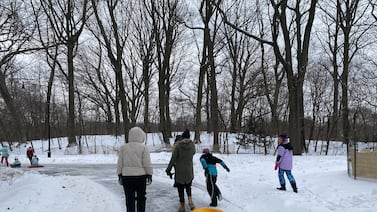Sign up for Chalkbeat Tennessee’s free daily newsletter to keep up with statewide education policy and Memphis-Shelby County Schools.
Tennesseans got their first glimpse of Gov. Bill Lee’s plan to create a universal school voucher program that could eventually give all families tax dollars to pay for private school.
Two months after Lee announced his proposal, a draft of the Senate bill was inadvertently filed Monday due to a miscommunication, then removed a short time later from the legislature’s website.
Elizabeth Lane Johnson, the governor’s press secretary, said the draft’s “key pillars” are accurate, but she emphasized the document is a “framework” for ongoing discussions.
Johnson said majority leaders in the Senate and House will file so-called “caption bills” this week to outline the legislation’s intent and to meet filing deadlines. Full legislation, with updated details, will be filed later through amendments.
Here are five things that stand out about the plan, based on a Chalkbeat analysis of the eight-page draft.
No testing accountability
While the governor has repeatedly pledged to build accountability into his proposal, the draft wouldn’t require participating students to take state tests, or other assessments.
There’s no accountability provision — or mention of the word accountability — in the draft. There’s also no reporting requirements to track how students are doing, or evaluate the program.
Public school students are required to take annual TCAP tests in math, English language arts, science, and social studies. Students who participate in Tennessee’s current voucher program — which offers education savings accounts, or ESAs, to students in three counties — have to take state tests every year in math and English language arts.
The ESA program’s first test results, from Memphis and Nashville in the 2022-23 school year, were disappointing. Most of the 452 participating students performed worse than their peers in public schools after the program’s swift rollout earlier that school year, according to data from the state education department.
Lee emphasized accountability through parental choice when promoting his plan during visits last month to private schools in Memphis and Chattanooga.
Asked about the omission of testing requirements in the draft, Lee’s press secretary said the governor looks forward to having those discussions with members of the General Assembly.
No language to prohibit discrimination
The voucher movement has some roots in racist opposition to school desegregation in the mid-20th century, and critics have long charged that private schools pick and choose which students they want when accepting public funding through vouchers.
The draft legislation includes no language to prohibit discrimination based on race, creed, color, national origin, religion, disability, or sexual orientation.
Anti-discrimination language is frequently included in state laws regarding eligibility for education programs.
In fact, Tennessee’s 2019 education savings account law requires participating private schools to certify that they will “not discriminate against participating students or applicants on the basis of race, color, or national origin.”
No guarantees for students with disabilities
Private schools would not be required to provide the same level of services as public schools for students with disabilities, according to the draft.
The language says: “Although an eligible student participating in the program does not retain the right to receive special education and related services through an individualized education program, the student may be eligible under the (federal) Individuals with Disabilities Education Act … to receive equitable services through an individualized service plan.”
Essentially, parents in a private school can request some publicly funded special services, but with no guarantee of exactly what their student would receive.
By contrast, public schools are required to provide students with disabilities with specialized support and services determined collaboratively by school leaders and parents.
“In practice, what this means is that students in private schools have a lesser right to disability-related services than those in public schools, and often receive fewer, more generic accommodations and services,” said Jeff Strand, a spokesperson for the Tennessee Disability Coalition.
More private schools could participate, but not from out of state
While Tennessee’s current ESA program is open to state-approved or accredited private, independent, and parochial schools, the draft opens the door to other school categories that have little to no state oversight.
Those include church-related schools or other private schools that the state merely acknowledges are in operation.
The lack of accreditation from schools in those categories may affect a voucher student who wants to transfer back into a public school in the same grade. Public schools may require testing to determine grade level or number of credits.
The language specifies the school must be located in Tennessee, which would prevent out-of-state virtual schools from participating.
But there’s no mention of an application process for a school to participate, as the education savings account program requires.
Nor is there text to support tiny home-run schools, in which the parent must report to their local school district that their child is being home-schooled. However, church-related home schools, which typically have a minimum of 10 students, appear to qualify.
Funding for the new voucher program isn’t a sure thing
As the governor announced earlier, the program would start with up to 20,000 students statewide who would get $7,075 in taxpayer money next school year to attend a private school, or certain home schools.
Half of those students must be considered economically disadvantaged or currently participating in the ESA program. And beginning in 2025, all K-12 students would be eligible to receive vouchers, regardless of their family income.
If 20,000 students participated, it would cost the state $141.5 million a year, which would increase if the program grows in subsequent years. But the draft says any voucher disbursements would be “subject to appropriations and other available funds.”
Tennessee revenues have flattened since the 2023-24 fiscal year began last July, and financial experts have urged lawmakers to rein in spending.
Meanwhile, state lawmakers are closely watching developments in Arizona, the first state to offer universal school choice. That state is struggling to cover the costs of the universal school voucher program approved last year by its Republican-controlled legislature.
Below, you can read the draft legislation.
Marta Aldrich is a senior correspondent and covers the statehouse for Chalkbeat Tennessee. Contact her at maldrich@chalkbeat.org.





